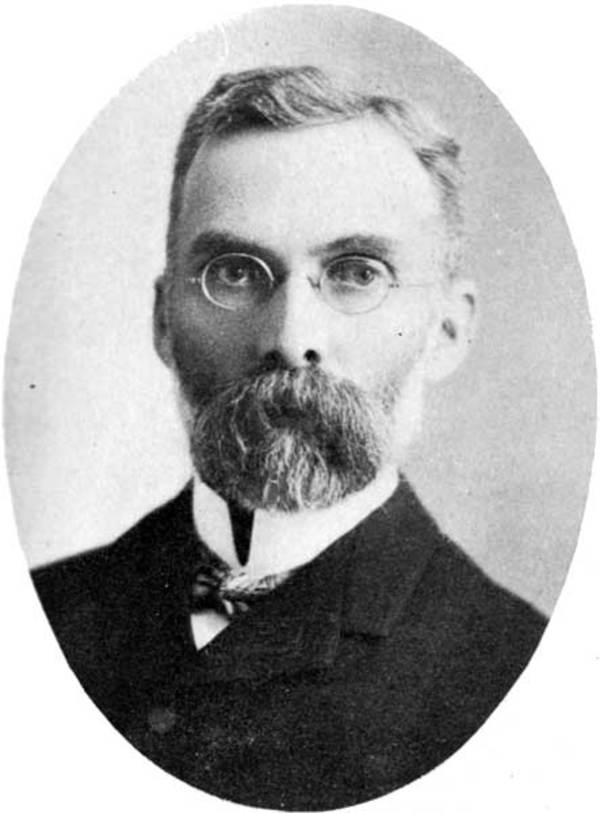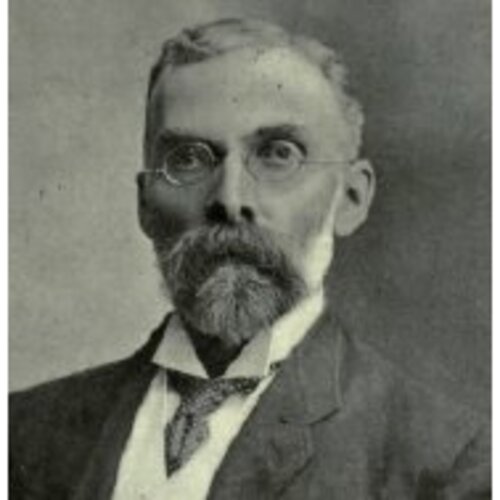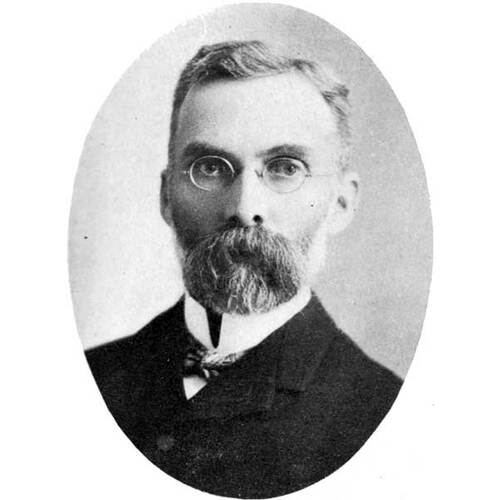
Source: Link
BOLE, DAVID WESLEY, pharmacist, businessman, and politician; b. 15 Feb. 1856 in Watford, Upper Canada, eldest son of James Bole and Ann Murdock; m. 3 March 1880 Isabella Lennox in Thedford, Ont., and they had two daughters and at least two sons; d. 24 June 1933 in Winnipeg.
Near the middle of the 19th century James Bole and Ann Murdock emigrated from Ireland and settled in Lambton County, Upper Canada, where they married, prospered, and raised a family in the Methodist faith. David Wesley was their first son and the second of their six children. From an early age he demonstrated the determination that would propel him through a remarkable career. He received his early education at the Watford Public School, obtained a job as a grocery clerk at age 13, graduated from the Canadian Literary Institute in Woodstock [see Robert Alexander Fyfe*], and worked as an editor of a Watford newspaper before enrolling as an apprentice with a pharmacist to learn the profession. In 1880 he obtained his licence from the Ontario College of Pharmacy [see Robert Watt Elliot*], which at the time was only a licensing body that offered no instruction. Just before he received his permit he married Isabella Lennox, daughter of Thomas Lennox, a merchant in Thedford. Within a few months he became involved in a drugstore business in Brighton. Two years later the Canadian west beckoned, and Bole, along with his wife and other members of the family, moved to the District of Assiniboia.
On taking up residence in Regina, Bole established what is said to have been the first drugstore between Brandon, Man., and Kamloops, B.C. After his brother-in-law John Dawson and Regina druggist Robert Martin became his partners, the business soon expanded to include wholesale trade as well as retail. Dawson, Bole and Company developed into a highly prosperous enterprise with stores throughout the prairie provinces. Now a prominent citizen, Bole was appointed a member of the provisional school board and in 1886 he was elected president of the Regina Board of Trade.
Bole’s ambitions rapidly outgrew the limited opportunities available in the pioneer community, and in 1889 he and Dawson wound up their retail interests in Regina and relocated the wholesale arm of Dawson, Bole and Company to Winnipeg, then the booming financial centre and commercial-distribution hub of the rapidly developing Canadian west. Although successful, the Dawson, Bole partnership was dissolved by 1892 and Dawson returned to Regina. Bole formed a new wholesale-drug venture with James Reynolds Wynne that was known as Bole, Wynne and Company. Then Bole, Wynne merged with the firm of another drug wholesaler, Edward Daniel Martin; the organization became the Martin, Bole and Wynne Company, probably in 1895.
Successful though the business was (it would remain profitable up to its sale in 1917) Bole sought a greater challenge, and in 1898 he left Martin, Bole and Wynne to create the Bole Drug Company Limited, of which he was the president and majority shareholder. The firm grew rapidly and within a short time it was the leading drug wholesaler on the prairies; within five years it had outgrown its leased premises and a modern warehouse, the Bole Drug Building, was constructed.
During the 1890s Bole’s involvement in civic affairs had kept pace with his business accomplishments. Starting in 1894 he was elected eight times to the Winnipeg School Board and he held office as its chairman for three years. In letters to Prime Minister Wilfrid Laurier* he expressed the hope that Protestants and Roman Catholics would be able to compromise on educational issues in the aftermath of the Manitoba school question [see Thomas Greenway*]. He served as a Winnipeg alderman in 1893–94 and lost a bid for the mayoralty in 1896 to Richard Willis Jameson*. That year he was one of several business and civic leaders who established the Western Canadian Immigration Association to encourage Americans to settle in the Canadian west. He would preside over the organization in 1905. In addition, he belonged to the Winnipeg Board of Trade and held the presidency in 1897.
Bole had long been a member of the Liberal Party and had served as president of the Winnipeg Liberal Association when, in 1904, he accepted a nomination as the Liberal candidate for Winnipeg in the federal general election. Chosen by a sizeable majority, he represented the riding until 1908. In the House of Commons he spoke occasionally on business and financial matters and defended the interests of his constituents. He did not contest the next election, probably because he had moved to Montreal for professional reasons. Remarkably, during his term as mp he orchestrated his most notable business achievements.
In the closing years of the 19th century retail and wholesale trades of all types were largely in the hands of independent entrepreneurs who served local markets; the ventures in which Bole was involved were typical. At the beginning of the 20th century the Canadian drug industry entered a period of dramatic change. While most of the early drug wholesalers carried a wide yet standard range of nationally recognized drugs, toiletries, and home remedies, weak regulatory measures allowed them to produce and market their own brands or versions of many of these products. The result was that the quality and consistency of such products often varied considerably; as late as 1900 there remained some serious concerns about the efficacy and purity of many products. The opportunity for bold action became obvious to Bole.
Over the years Bole had formed strong ties with another prominent drug wholesaler, Charles Widdrington Tinling of the Dominion Drug Company Limited in Hamilton, Ont., and eventually the two came to share a similar vision. Their plan was to bring the strongest and most successful regional drug wholesalers from across the country into one national corporation. The new company would establish its own factories for producing a complete range of consistently high-quality drug and toiletry products to be distributed through its wholesale branches. As planning progressed Bole and Tinling were joined by Theophilus Hatton Wardleworth of Evans and Sons Limited of Montreal, and the three began a coast-to-coast tour to sell the idea. Their project met with wide acceptance and by early 1905, 16 well-established independent drug wholesalers had agreed to merge their businesses.
On 9 Nov. 1905 the National Drug and Chemical Company of Canada Limited was incorporated with an authorized capital of $6 million. Its head office was in Montreal. Bole was elected president and Tinling and Wardleworth were assigned senior management roles. The 16 founding businesses began trading as branches of National Drug in 1906, and the second vital stage of the process, the creation of state-of-the-art facilities, began almost immediately. A new plant, known as the Chemical Works, was followed in 1907 by the establishment of a pharmaceutical-manufacturing laboratory in Montreal. That year, a third new factory, located in Toronto, began to produce a wide range of home remedies and toiletries under the Na-Dru-Co label. Some 20 products initially appeared, but soon the line included 125 items, including cough syrup, skin cream, shampoo, and toothpaste. In 1908 another division was created to manufacture and market under licence goods that were not part of the Na-Dru-Co line. The Na-Dru-Co products benefited from intense and often innovative publicity, involving billboards, newspapers, and in-store promotions. Special campaigns were aimed at retail-store owners: the company sent them monthly newsletters, and it published almanacs and calendars (full of the company’s advertisements) for them to distribute to their customers. Most important was the firm’s price-protection policy; National Drug proposed to sell only to retailers who signed an agreement to respect the prices it set for goods, thus eliminating the undercutting that had been prevalent in the drugstore business at the time [see Charles Allen Gordon Tamblyn]. By August 1910 National Drug claimed that 94 per cent of the owners of Canadian retail stores had signed. The company also began to develop an export market, particularly in the Caribbean. Although the financial reports for the early years cannot be located, the firm experienced phenomenal growth. Distribution centres were opened in Calgary (1911), Regina (1912), and Vancouver (1913). By 1918 14 centres were located across the country. Two years later National Drug reorganized its administrative structure, a necessity since its business had increased by 250 per cent in the previous 10 years. National Drug had become Canada’s pre-eminent drug wholesaler and manufacturer as well as one of the largest pharmaceutical companies in the British empire. At the beginning of the 21st century, National Drug (as McKesson Canada) remained Canada’s leading drug wholesaler.
In 1922, after having led National Drug for almost two decades, Bole retired at age 66, citing family matters and health problems as his reasons for stepping down. He returned to Winnipeg, where he resided until his death from a stroke on 24 June 1933. A man of drive, vision, and integrity, he had set up and directed one of the country’s major corporate entities and contributed substantially to the reshaping of the Canadian drug industry.
AM, GR6427, 43b Bole Drug Company; 63m The Martin Bole and Wynne Company. AO, RG 80-5-0-90, no.5317. LAC, R10811-0-X. Man., Dept. of Tourism, Culture, Heritage, Sport and Consumer Protection, Vital statistics agency (Winnipeg), no.1933-023191. Leader-Post (Regina), 24 June 1933. Manitoba Free Press, 9 Jan. 1904. Nor’Wester (Winnipeg), 21 Jan. 1896. Winnipeg Tribune, 24 June 1933. John Bachynsky and K. C. Waite, “David Wesley Bole: pharmacist, manufacturer, wholesale leader” (paper presented at the Canadian Academy of the History of Pharmacy, 3 June 2007). Can., House of Commons, Debates, 1904–8. Canadian directory of parl. (Johnson). Canadian men and women of the time (Morgan; 1912). CPG, 1904–8. Cyclopædia of Canadian biog. (Rose and Charlesworth), 3. National Drug and Chemical Company of Canada, Centennial/Anniversary souvenir: a commemorative volume celebrating Canada’s centenary and National Drug’s 60 years of service ([Montreal, 1967]); National Drug and Chemical Company of Canada Limited: national merchandiser, March, 1956 ([Montreal, 1956]). K. C. Waite, Medis: the story of Canada’s leading drug wholesaler (Kirkland, Que., 1994).
Cite This Article
Kenneth C. Waite, “BOLE, DAVID WESLEY,” in Dictionary of Canadian Biography, vol. 16, University of Toronto/Université Laval, 2003–, accessed April 25, 2025, https://www.biographi.ca/en/bio/bole_david_wesley_16E.html.
The citation above shows the format for footnotes and endnotes according to the Chicago manual of style (16th edition). Information to be used in other citation formats:
| Permalink: | https://www.biographi.ca/en/bio/bole_david_wesley_16E.html |
| Author of Article: | Kenneth C. Waite |
| Title of Article: | BOLE, DAVID WESLEY |
| Publication Name: | Dictionary of Canadian Biography, vol. 16 |
| Publisher: | University of Toronto/Université Laval |
| Year of revision: | 2018 |
| Access Date: | April 25, 2025 |




